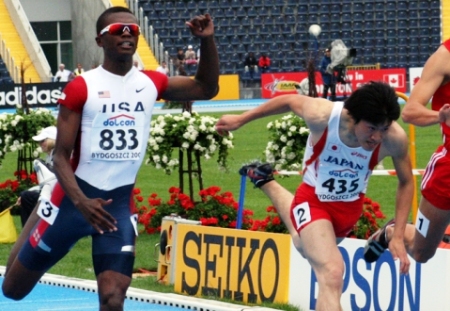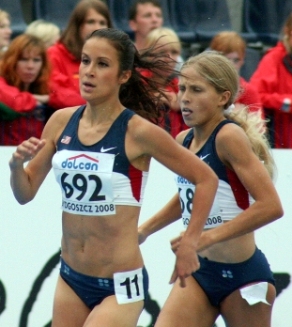 |
 |
 |
|
|
 |
 |
 |

 | 2008 IAAF World Junior
Championships
July 8-13, 2008 - Bydgoszcz, Poland
|
Day 6 - Booker 2nd in 110H; Jordan 4th in 1500
Highlights - Mike Kennedy Summaries - Day 6 Results - Joy Kamani NSSF Gallery - USATF Story/Quotes - Jim Spier NSSF Blog

Left photo: Booker Nunley (left) is 2nd in the m110Hs; right photo: Jordan Hasay (right) and Alex Kosinski would finish 4th/6th in w1500. Photos Joy Kamani
|  |
Team USA Highlights
- Prep Booker Nunley NC grabs 2nd in the men's 110H with a 13.45 (+1.1w), just .05 off his PR
- Prep Jordan Hasay CA takes 4th (4:19.02) and collegian Alex Kosinski CA 6th (4:21.26) in a women's 1500 that goes out in 1:14-2:25 before a blazing finish.
- Team USA roars to both 4x400 Gold Medals
- Preps Lanie Whittaker FL (1st leg, 52.65) and Erica Alexander TX (3rd leg, 52.50) join collegians Jessica Beard and Takecia Jameson in easy 3:30.19 victory.
- Marcus Boyd started things off and USA leads wire-to-wire with his fellow collegians Bryan Miller, O'Neal Wilder and Jeshua Anderson in decisive 3:03.86 victory.
- Preps Anna Jelmini CA (162-03) and Erin Pendleton OH (158-11) are 7th and 11th in the women's discus
| Mike Kennedy Event Summaries
Men - Women
5,000 Meters
After the first three laps, Vincent Yator and Matthew Kisorio, both of Kenya, had moved to the front and would take the field through kilometer splits of 2:39.91 and 2:41.27. Shortly before 3,000 meters, Kisorio took over the lead, passing 3,000 in 7:57.57. Kisorio then attempted to break the field, building a 20 meter lead, but Abrehamn Cherkos and Dejen Gebremeskel, both of Ethiopia, hung tough and did not lose contact.
Kisorio passed 4,000 meters in 10:34.26 and, shortly thereafter, he again tried to pull away but the two Ethiopians remained close. With on lap remaining, Cherkos took the lead but he could not shake Kisorio. It was only in the last 120 meters that Cherkos was able to pull away for the win in a Championship meet record of 13:08.57. Hillary Chenonge of Kenya set the old Championship record of 13:28.30 in Kingston, Jamaica in 2002. Kisorio was second at 13:11.97. Geofrey Kusuro of Uganda passed Tonny Wamulwa of Zambia in the final straight to take fourth, 13:31.80 to 13:33.09. The final kilometer was covered in just under 2:35.0.
The USA’s Matt Centrowitz of Oregon and Ryan Collins of Virginia were in a group of four at the back of the pack for most of the race. With two laps to go, Centrowitz began to move and got up for 11th place in a personal best of 13:58.31. Collins finished in 16tn place at 14:30.16. Contributing to the fast times were temperatures in the mid 50’s with a heavy cloud cover and drizzle.
3,000-Meter Steeplechase
Benjamin Kiplagat of Uganda, who came in with personal best of 8:14.29, was going to make sure that the winning time was going to be in that range. After one kilometer, passed in 2:34.51, he was on pace to run 7:45.0, seven seconds faster then the world record. Kiplagat slowed with a second kilometer of 2:48.70, but continued to hold a 50-meter over Jonathan Ndiku and Patrick Terer, both of Kenya, and Legese Lamiso and Dereje Abdi, both of Ethiopia.
With three laps remaining, the two Kenyans separated themselves from the Ethiopians. All the while Kiplagat continued to hold a 30-meter lead. With two laps to go, Ndiku began to pull away from his teammate and Abdi also pulled away from his teammate. Kiplagat appeared to be tiring and, with one lap remaining, Ndiku was on the hunt and he had Kiplagat in his sights. Coming off the last water jump and 150 meters from the finish, Ndiku passed Kiplagat and went on to win, 8:17.28 to 8:19.42. Kiplagat paid the price of an outrageous early pace as evidenced by his 2:55.36 final kilometer. Terer was third at 8:25.14 and Abdi was fourth at 8:32.91.
Dylan Knight of UCLA and Curtis Carr of BYU started out in 11th and 12th in the 12-person field and worked themselves up to ninth and tenth over the final three laps, with Knight running 8:52.90 and Carr getting a personal best of 8:53.79.
110-Meter High Hurdles
Booker Nunley of Garner (N.C.) appeared to have gotten a good start, but by the time he reached the first hurdle he was no better than third behind Jin Nakamura of Japan and Konstantin Shabanov of Russia. At the halfway point, Nunley found himself around fifth and fighting for survival. While Shabanov -- whose father was a national record holder in this event in the former USSR -- pulled way from the field, Nunley was busy pulling himself back into contention.
Off the final hurdle Nunley moved from fourth to second, finishing in 13.45. Kerion Stewart of Jamaica was third at 13.51 and Sami Al-Hayder of Saudi Arabia was fourth in the same time. Aleksey Dremin of Russia was fifth at 13.52 and Nakamura of Japan was sixth at 13.53.
4 x 100-Meter Relay
This race was like a stroll in the park. Marcus Boyd of South Carolina opened up at 46.1, followed by Bryan Miller of Texas A&M at 46.2 and O’Neal Wilder of Mississippi St., at 45.3. Jeshua Anderson of Washington St., the 400-meter hurdle Gold medal winner, brought the baton home and the U.S. had an easy 3:03.86 win. Britain and Germany staged an exciting battle for second with Britain prevailing all the way, 3:05.82 to 3:06.47. Rolando Berch of Jamaica brought his team form last to last to fourth on the third leg and Akino Ming kept them in fourth and finished in 3:08.58.
High Jump
Through 7-1 ½, Bohdan Bonderanko of Ukraine, Sylwester Bednarek of Poland, Miguel Sancho of Spain, Umit Tan of Turkey and Sergey Mudrov of Russia, each had no misses in the competition. Tann and Mudrov each had three misses at 7-3 and tied for fourth place while the three remaining jumpers each cleared on their second attempts. The bar moved to 7-4 ¼ where Bondarenko, who was jumping first, and Bednarek both cleared on their first attempts, while Sancho missed three times and had to settle for the Bronze.
The bar was moved to 7-5 and Bondarenko cleared on his first attempt for the best jump in the world this year by a Junior. Bednarek then had a tantalizingly close miss as the home country crowd let out a collective moan. Bednarek passed his final two attempts at 7-5, because nothing could be gained by a clearance, and the bar was moved to 7-5 3/4. Bondarenko missed twice and when Bednarek missed his second time, the medals were decided with Bondarenko taking the Gold and Bednarek the Silver. Bondarenko did take his final attempt at 7-5 3/4 but missed. .
Women
1,500 Meters
The race opened up with the African runners going right to the front and then promptly slowing the pace, passing 300 meters in 54 seconds and 400 meters in 1:14.36, with Kalkidan Gezahegne of Ethiopia in front. As you might imagine, the gap between first and 12th was about five meters. During that time Alex Kosinski of Oregon and Jordan Hasay of Mission College Prep (San Luis Obispo, Ca.) were in 9th and 10th. With two laps to go, passed in 2:08.0, Gezahegne continued to lead with Ioana Doaga of Romania and Stacy Ndiwa of Kenya right behind. Hasay was in 11th and Kosinski in 12th.
At 800 meters, passed in 2:25.30, the pack was still very tight and it remained so until just one lap remained, passed in 3:13.0, with Kosinski in sixth and Hasay in seventh. When the runners passed 1,200 in 3:30.23, the real running began. Stephanie Twell of Britain, who was eighth in the 2006 World Junior Championships and second in the 2007 European championships, surged to the lead, passing Gezahegne. Emma Pallent, also of Britain, who along with Twell had never been far from the lead moved into third.
The three remained in that order, with Twell winning in 4:15.09, Gezahegne in second at 4:16.68, and Pallant third at 4:17.06. Meanwhile, Hasay, who had finished second in last year’s World Youth championship, also began to move, passing Kosinski and then Bridey Delaney of Australia and taking off after the top three but that proved to be a bridge too far. Showing the effects of an all-out sprint, she rounded the final turn and began to slow, but then summoned up enough energy to finish fourth in 4:19.02. Delaney was fifth in 4:21.21 and Kosinski was sixth in 4:21.26. It is interesting to note that both Gezahegne and Hasay will be eligible for the 2010 World Junior championships in Moncton, Canada.
4 x 400-Meter Relay
Much like the men’s race, this was a walk in the park. Lanie Whittaker of Washington (Miami, Fl.) opened up with a 52.9, followed by Jessica Beard of Texas A&M at 51.0 and Erica Alexander at 52.78 before Takeica Jameson of Miami brought the baton home in 53.4 to give the Americans a 3:30.19 win. Meanwhile, Russia and the Ukraine were second and third through two legs before Australia got a huge third leg from Olivia Tauro to make it a three-team race for second with a lap to go.
However, the anchor leg Russia began to drop back and France came into the picture, so that with 100 meters to go it was a three team race between Ukraine, Australia and France. Ukraine eventually prevailed, finishing in second at 3:24.20, followed by Australia at 3:34.26 and France in fourth at 3:35.83.
Discus
After the first round, Viktoriya Bolbat of Ukraine was the leader at 170-10, followed by Julia Fischer of Germany at 168-3 and Sandra Perkovic of Croatia at 167-3. Shangxue Xi of China, throwing second in the second round, moved into second with a toss of 169-3. Three throws later, Perkovic went into first with a throw of 179-8, and three throws after that Fischer went into first with a toss of 179-5. In the fourth round, Xi retook the lead with a throw of 180-4 and that is the way the competition for the medals ended.
Anna Jelmini of Shafter (Ca.), the World Junior leader at 183-11 with her throw at Salinas, opened up at 161-1, which was good enough for fourth place after the first round. She improved to 162-7 in second round, which left her in fifth place, but she did not improve in the final four rounds and finished in seventh place. Erin Pendleton of Woodmore (Elmore, Oh.) had a first round throw of 158-11, but did not improve in the next two rounds, and finished eleventh.
Standings
The United States finished with 11 gold medals, four silver medals and 2 bronze medals for a total of 17. Kenya finished with 11 medals (six gold), followed by Germany and Ethiopia, with 10 each and Cuba with eight. Scoring through eight places had the United States in first place with 174 points followed by Germany with 122, Kenya with 102, Russia with 96 and Ethiopia with 86.
|
World Junior Champs Index
|
|
|
|
|
 |
 |